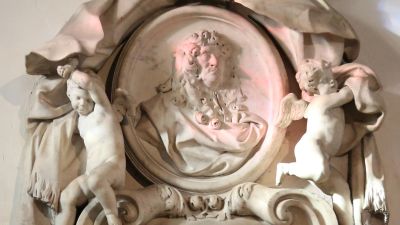Row over bid to move Cambridge University college memorial to slave-trade investor Tobias Rustat

A dispute over whether a Cambridge University college can relocate a memorial to a wealthy benefactor who invested in slave-trading companies will be heard in an ecclesiastical court.
Tobias Rustat, who invested in the Royal African Company in the 17th Century, became one of Jesus College's biggest benefactors before the 20th Century.
The college last year applied to the Diocese of Ely to move the memorial from its chapel to a permanent exhibition space in the college - a move which has been opposed by several college alumni.
A consistory court case, to be heard by an ecclesiastical court next week, is due to help decide the fate of the monument.
College archivist Robert Athol said last year that the plan to move the monument to an exhibition setting would “allow for restoration and study of the monument, and it will enable people to engage with it as an artistic piece and as a vehicle for discussion about the history and legacy of enslavement”.
The marble memorial is on a wall within the college’s chapel and was commissioned by Rustat during his lifetime when he was already a major college donor.
Following recommendations made by the College’s Legacy of Slavery Working Party in 2019 and 2020, the college took the view that the memorial represents a celebration of Rustat which is “incompatible with the chapel as an inclusive community and a place of collective wellbeing”.
The Master of Jesus College, Sonita Alleyne, said that the college’s proposal to move the monument to an educational exhibition space was “part of a process of critical self-reflection on the long-term legacies of enslavement and colonial violence”.
“The chapel should offer a welcoming space accessible to every member of our community,” she said last year. “This is the right solution for our college.”
A number of college alumni have objected to the proposal to move the memorial.
A Jesus College spokesperson said on Monday: “It comes down to whether it’s in the best interests of our current and future students and fellows for this celebratory memorial to be in our chapel, a place of worship at the heart of our diverse community.”
The consistory court case is listed for three days from February 2.
In a page on its website addressing Rustat's role in its history, Jesus College said the work of the Royal African Company was "a brutal and sustained trade in human life that exploited thousands of people".
It added that "investors in the RAC were fully aware of its activities and intended to profit from its exploitation".
"Jesus College acknowledges that involvement in enslavement, trafficking and exploitation is unambiguously wrong," it said.